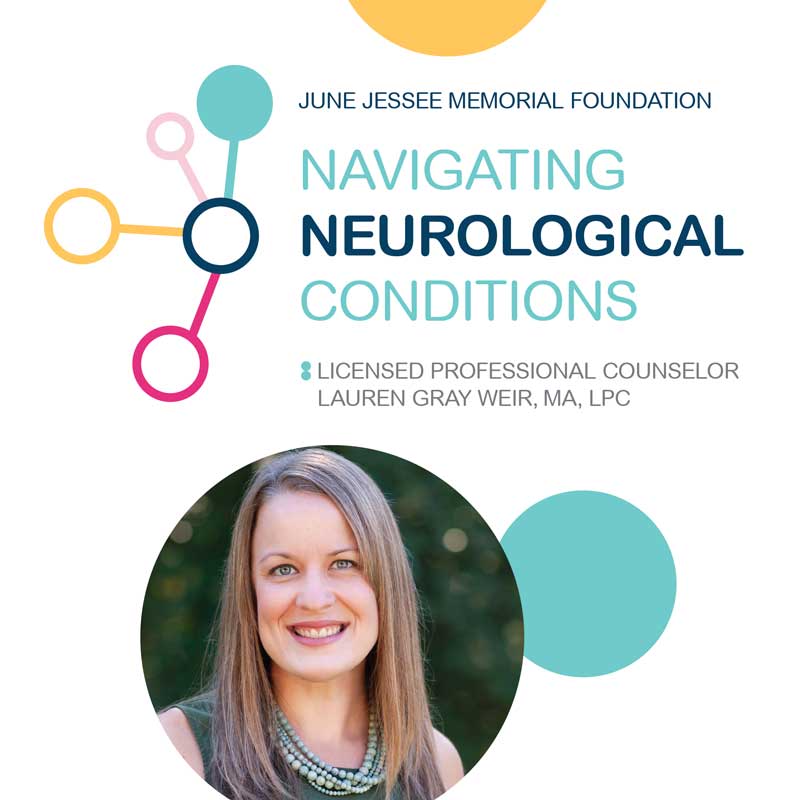Navigating Neurological Conditions: Licensed Professional Counselor, Lauren Gray Weir, MA, LPC
TRANSCRIPT
This webinar is an interview between Genny Jessee, executive director of the June Jessee Memorial Foundation (JJMF) and Lauren Gray Weir, MA, LPC. Lauren is a Licensed Professional Counselor in the State of Missouri with over 10 years of experience treating individuals, couples and families facing a variety of challenges, including anxiety, depression, trauma and abuse, and various relational issues. Her areas of specialty include parenting, chronic stress, grief and medical trauma. She is the Head of Family Therapy at Lasting, a self-guided therapy app by Talkspace.
Lasting: Marriage and Couples is a research-based program that helps couples nurture their emotional connection and repair relationship issues.
This interview was recorded on May 5, 2022
JJMF:
What brought you to the field of marriage and family therapy, specifically working with families caring for children with significant health issues?
Lauren:
I was working for Washington University’s Perinatal Behavioral Health Service, and during my time there I had the opportunity to help develop a program for families with children who had congenital heart defects. While working with those families, I realized what an incredible need there was. I also realized that it is a personal passion of mine to help families thrive, and realized that the various stressors that couples go through when they have a child with a medical complication is generally not talked about and it’s not been a priority. And so, it’s been exciting to see over the four or five years I was doing that, just how much more people are talking about this, that there’s more research about it now, and it’s becoming more of a priority, which is very exciting.
JJMF:
What is it about caring for children with medically complex conditions that stresses a marriage or a partnership?
Lauren:
I think about this in two tiers. One is that whenever there’s a stress on a family, like having a child with a complex medical condition, it’s going to stress both individuals in the partnership, as well as the couple, because whenever you have one person or both people in a partnership experiencing high levels of stress, it’s going to have an impact. Some of the ways that we see that play out are just suddenly you’re reprioritizing your time, time that was maybe spent focusing on what your needs were as a couple or a family are having to be siphoned into new priorities. What does it look like to take care of our child? To find new space and energy for that.
Also, there’s research on the impact of chronic stress and trauma in terms of how that affects individuals and couples, as well. When you’re experiencing chronic stress, you’re experiencing high levels of cortisol in your body, and this impacts mental health and physical health. Whenever an individual is experiencing those things, you’re not going to be putting your best foot forward in your relationship.
The other impact of that, is in terms of realizing that in order to take care of your child and all of the additional things that come with that, you suddenly aren’t making space, or don’t have space in your life, to put the energy and time that is required to maintain a healthy relationship. Suddenly those date nights go by the wayside. You’re exhausted at the end of the day. And maybe you’re just falling into bed without reconnecting. And over time it’s like a deterioration in the things that make the building blocks of a strong foundation in a relationship.
Genny:
I know for my husband and I, when June was alive, it was just one thing after another. First it was hearing loss, then she was having seizures and then it was one catastrophe after another. I found that I wanted to talk about it all the time. I was just talking and talking and Matt would get annoyed. I didn’t know why he was getting annoyed. Thankfully, my therapist at the time pointed out to me how not only do people handle things differently, but couples handle things differently too. And it was like an “aha” moment, but it was like he’s coping with it and I’m coping with it and how we cope with it is different. Like, he may not want to talk, he may want to compartmentalize it. I may want to talk about it all the time.
So finding different places to get that need met was really important. I needed to talk and talk and talk and he needed to kind of put it in a corner and not always talk about it. So I think once I was able to realize that we’re handling it together, but we’re also dealing with it separately, too.
Lauren:
I think that’s such a good point, Genny. In many conversations with couples, sometimes people will feel that they shouldn’t burden their spouse with their own grief or stress, or the ways that they’re processing. This is not true across the board, but often women have more of that need to process, but then there’s this battle of, “Oh, my husband seems so chill. How is he doing so okay?” And a lot of men do tend to feel that they don’t have as much need to verbally process or their role is to be the strong one. So they don’t talk about it. Then the other spouse is left feeling like, “Well, I can’t talk about this because they’re doing fine and I don’t want to burden them with how I’m feeling about this.” I think it’s really important to keep the principle in mind that your partner can’t read your mind. Being able to have those meta conversations about, what are the ways that we need to process our experience and where do we need to go for that processing?
So, I think, what you’re saying, going to a friend’s or other support partners in your situation was a helpful solution to that. And even deliberately setting aside time for conversations like, “Where are we both at? What do we both need right now?”
Genny:
The other thing that I thought was really hard that I was not expecting either when you go through something like this is resentment built on both ends and working through that. I think for me I have to remind myself of who my husband is at his core. Because your mind can play tricks on you where you can feel like, “Why am I doing all this?” What helped me battle through some resentment feelings was talking about it, using “I” statements like, “I would like this.” Being more assertive and saying what I want. And maybe it is more like honing that skill helps, and reminding myself that both of us are just trying our best. But maybe you have some other tips on how to deal with resentment.
Lauren:
When a couple has something that disrupts or jars the way that they’ve typically done their relationship, it’s a time to reevaluate. That may have to happen in multiple iterations over time. And where we get into those kinds of marital traps is where we assume things can keep working the way they always have. I would suggest stepping back and checking in with yourself in terms of, “Okay. Wow. I am realizing that the internal monologue I have going on right now is really negative.”
Lauren:
Evaluate your needs as an individual and present those to your spouse because your needs
may change over time. Maybe the system that you had in terms of how you were running your household and balancing your responsibilities worked great in your pre-child life or your life pre having a child with a medical complexity, but you have to reorganize and reshift priorities and figure out how you are going to make the balance work so that those feelings of criticism and resentment don’t start to build within each other.
It may look totally different. If you were doing all of the household things before and suddenly, you’re having to spend a lot of your energy and time taking care of your child, some of those things are going to go by the wayside and maybe you need more support from your spouse for some of those things.
One of the things that we talk about is mental load. This is the weight we carry around in ourselves all the time that are just all of the things that we have to take care of. And when we don’t talk about the mental load that we’re carrying, that’s when that resentment starts to build. So bringing that to the forefront, bringing it to the surface can be a really great antidote to some of that negativity.
JJMF:
Do you have any other tips or advice on how to make your marriage stronger under the stress of caring for a medically complex child?
Lauren:
One thing that I think is really important is for each individual, and as a couple, to do a couple of things. Evaluating where are we at? Checking in with yourself, like, “What are my unmet needs right now? Do I have a need for time alone? Do I have a need for social time with a friend? Do I have a need for more connection with you as my partner? Do I have a need for a bath once a week, just to relax?” Evaluating what need of mine is going unmet, because again, those are the things that generate those negative feelings and are disconnecting in a relationship, if you’re not getting your needs met.
But then also doing that as a couple. So, “What are our relational needs? Where are we noticing that our relationship needs some strengthening and refueling?” Maybe that’s spending more time together, maybe that’s having coffee for five minutes on a Monday morning. I think you have to find ways and solutions that work for your situation and not develop unrealistic expectations.
So, that’s the first step: Identify, verbalize and bring to the surface what those needs are and then find your motivation for that. Because I think what happens is that we do the things we have to do, right? So taking care of a child with medical complexity, it’s non-negotiable. You are going to take that child to their appointments, you’re going to make sure that they get the care that they need. And so what we tend to think is that everything else is negotiable. And I think part of that is just resetting your intentions in terms of saying, “Hey, if our relationship is a priority, then we have to attend to our needs as a couple and as individuals.”
One analogy I use is if you’re driving your car and the fuel gauge light comes on, you’re not just going to power through. You’re not just going to say, “Okay. It’s fine. I’m sure that the car will just keep running forever without me refueling.” No, you’re going to find a gas station and stop. And so it’s that same thing when it comes to our relationship.
Lauren:
The last piece of this is setting some attainable goals and putting some things on the calendar. You’ve identified your need, you’ve identified your motivation and then it’s following through. So if your need is that, as a couple, you need two 15-minute time slots a week to chat about things and check in and set that time, then figure out where it works in your relationship. How can we find that time? How can we just go ahead and pin this into our calendar so that we are prioritizing this and not letting something get in the way?
And again, getting creative within the circumstances of your life, we don’t want to come up with unrealistic expectations for yourself or your relationship. Where can you get creative? Maybe it’s just that you need to text each other once a day with some kind of cute, loving phrase, even if you’re not feeling it. Just those ways of reconnecting and reprioritizing your relationship.
Genny:
I love that texting one. One thing that I found hard sometimes is what’s something you can do for fun? Do you have creative ways, small things that couples can do? Like, yes, you can go to dinner or go to coffee, but that’s a lot of talking focus, which is not bad, but sometimes you want to get out of your head and bring the fun back.
Lauren:
The big things are great, but in some ways, especially when you have young children or you have a child with a medical complexity, those things take so much activation energy and planning.
You have to get babysitting that’s appropriate, you have to have money to do it, you have to feel energized to even want to do that because you might be exhausted. And so those things are great occasionally. But I do think you’re totally spot on that you have to find things that are realistic. And I absolutely love just the thought of bringing fun back, because I do think that’s something that does go by the wayside.
I think creating new rituals is really important. For example, create a ritual of every other week, one person plans an in-home date night. And the following in-home date night is planned by the other person in the relationship. After the kids go to bed, have dinner together and watch a movie. It’s not really a time for us to have intense conversations about things. It’s just about enjoying each other’s company and having set aside that specific time for that ritual.
It really is lovely because we can count on it. And it’s also really nice because I’m only having to think about it once a month. I’m also able to rely on my husband being able to take the other half of that. I think just even doing things like pulling out a game you haven’t played in a long time, watching a comedy special that makes you laugh, because there’s a lot of actually good research into just the power of laughter to increase positive feelings in ourselves, and laughing together with someone that you love and enjoy is really good, too.
Lauren:
And then another thing is just making space again for physical touch and cuddling. So, we talk a lot about oxytocin in terms of when we have our babies and just kind of creating that attachment bond, but actually oxytocin is called the cuddle hormone and it’s one of four feel good hormones that increases a sense of wellbeing and connection to whoever we’re experiencing that with. And so, reminding yourself that even if you’re just watching a 25 minute special on a streaming service, where are you doing that? Are you cuddling? Are you holding hands while you do that? Because I think what happens is we start to lose that sense of connection and it may feel even uncomfortable or we’ve just forgotten how to do that. We’re used to having our kids sit between us. And so, cuddling, even if you fall asleep, because you’re tired. Those little ways that you can kind of build back the fun, build back the connection and not have it be so totally serious all the time.
We do need to talk about things, but also we need space to not talk about things and just to
be together. If there was an athletic activity you both enjoy doing that’s another one I always encourage, too. Like my husband and I are at different athletic abilities, but he will slow down his runs so that we can get out together and exercise and those things are really good, too. Or even just kicking a soccer ball around or something silly that you just wouldn’t think to do normally.
JJMF:
We talked a little bit about intimacy and cuddling and I completely agree that those are great parts of a relationship. But how can a couple ensure they keep their relationship a top priority?
Lauren:
One thing I think I would add to that is there’s this thing we do in relationships where we make what we call emotional calls or bids to our partner, and it’s a vulnerability. So if I am having a rough day and I lean into my husband for a hug, I’m hoping that he responds in the way that I want, right? And so I think part of prioritizing intimacy is also being willing to put yourself out there for those things. And so that can be physical things like I just mentioned, coming in for a hug, cuddling, things like that. But we also make emotional calls just in terms of our requests we make of each other in little ways, like spending time together, setting aside time for conversations, even little things like going to bed at the same time. Those things actually really do increase intimacy in a relationship. And it doesn’t mean that you’re both going to go to sleep at the same time. Maybe one of you is more of a night owl and can read in bed while the other one is falling asleep.
But what happens when we have kids is suddenly, again, our priorities are shifting. We don’t have as much time for spontaneity. And so we do have to schedule more of those things. We do have to think about them more deliberately. And I think part of that is the responsibility both to kind of make those calls towards our partner and ask for the things that we need and desire to feel close.
And the other is to respond even through our lack of energy or those feelings of resentment that we talked about, in order to provide that same kind of care for our partner. What is it that makes your partner feel close to you and feel intimate? What do they need from you? And I think asking those questions also is another way just to work past the assumptions. Maybe you really need to hear things from your partner. “I love you. You’re doing a great job. I see everything you do for our family.” And maybe your partner has a totally different need. Maybe they like to receive gifts or have you in some way do something for them that makes them feel loved. Maybe physical affection is their need. So I think it is important to just talk through what things make you feel connected and close, and how you both can support those things for each other.
JJMF:
The statistics are so daunting. What, if any, hopeful messages do you have to share with our families?
Lauren:
I think the biggest thing is that even little things that you do to prioritize your relationship do make a difference. I think even taking the space to recognize and evaluate “here’s where we are”. You’re miles ahead of a place you might be where you’re just doing the motions, or going through the motions, or living in your new reality or ritual. I think the second you start asking questions and bringing your relationship to the forefront as a priority, that in and of itself is very hopeful because you’re in a totally different head space when you’re doing that.
And I think the other thing is rebuilding your foundation as a couple in terms of, “We are doing this together.” So even re-identifying, or defining who you are as a couple in your new reality
and saying, “Okay, we’re doing this as a couple, not as two individuals kind of siloed in these two places.” Those are very powerful things, I think, in terms of reconnecting.
And also sometimes relationships get into a place where they need more help and that’s okay. It’s not a weakness to acknowledge that your marriage is suffering under the stress and strain of your daily life, or caring for a child with extra needs. And counseling is a great option. And I always encourage people to do that evaluation in what’s happening in their relationship before it gets to the point where you’re feeling like counseling is your last possible option. So therapy can be a great option just in terms of, “Hey, we think our relationship needs a booster shot. What do we need to do now in order to maintain?” What kind of maintenance does our relationship need in order to keep it strong rather than waiting until it gets to the point where you feel like things are just falling apart around you and it feels like you’re depleted.
JJMF:
When couples feel like they need to reach a therapist, how would you suggest going about finding one to work with?
Lauren:
There are many ways you can do this. First of all, if your insurance pays for any mental health benefits, then you can definitely call your insurance and find out what those benefits are and get a list of therapists in your area. There is also a website called Psychology Today that I always recommend because you can go in there and search for a lot of variables. Geographically who’s close? Do they do telehealth? What insurance do they take? Do they do sliding scale fees if you don’t have the insurance option? And what are their specialties? This is helpful in finding someone that feels like a good fit for your particular circumstance.
And then there also are great telehealth options, as well that I would recommend, such as Talkspace. Often, insurance even will reimburse for some online therapy providers. And for a lot of people that feels like a much more accessible option, because you can get a therapy appointment in while your child is napping or watching a show, and you don’t necessarily have to go get babysitting anymore to do that. Or you can find someone that provides therapy in the evenings when your kids are in bed and you and your spouse can do that together.
Lauren:
I have two more things to say about that. One is, obviously I write for Lasting, which is a self-guided app wing of talk space. And so for some people that maintenance bit can be handled just by finding ways that you can use an app that you both share and can connect through and work through some content that feels appropriate to you and work through some exercises and things like that to kind of bolster your relationship and tackle some of those problem areas. Maybe setting 5 or 10 minutes aside, a couple times a week, instead of setting an hour aside every week for therapy.
And then the last thing, just when finding a therapist, I always really encourage people to interview the therapist first. This is totally normal to do. In the same way that you wouldn’t take your child to a specialist that you didn’t feel confident in, it is totally okay to ask for a consultation or even just in your first session, ask some questions in terms of their level of training, whether they’ve worked with couples or individuals in your particular situation. Sometimes the first therapist you find is not always a good fit and that’s okay. And therapists can handle that. I would never want someone coming to see me for therapy, who just felt like I was not the right therapist for them. And the first person you find is not always a good fit, but finding someone that you feel comfortable talking with and that you really feel like has that expertise to help you, that is just such a huge boost when you’re struggling to feel like you’re in the care of someone who has an approach that feels connecting and good for you.
JJMF:
We’ve covered a lot of ground here in terms of tips and advice and resources and all of those things. Is there anything that we haven’t talked about yet that you wanted to share with our families?
Lauren:
I would add two pieces that we touched on briefly. It’s your own self-care. One thing that I really do want to emphasize is that when you are depleted as an individual it’s very hard to give into a relationship with your spouse or partner or with your children in ways that are healthy. And so some of that is really thinking through what the things you need in order to prioritize your own self care, because that does build you up to be a more energized and effective partner and parent, as well.
And I emphasize that for all parents. I have spent more time talking with moms and I will say that this is something that, for most moms I’ve talked with, is very hard to prioritize. It just feels like a selfish act. And it’s very hard to make the head space for taking care of yourself when you have children or a child who has high needs. And there’s a lot of research into the long term impact of parental stress and anxiety on our children. And so I encourage that as a motivator in some ways. If our kids are our goal, we want to raise them well, we want to provide what they need, then part of that is taking care of yourself as an individual and a person so that you are providing your child with the best possible version of yourself. And that takes work and effort, but it’s so worth it.
Genny:
Yeah. I just want to add more for reassurance that oftentimes when you have kids, it’s early on in a relationship or marriage. And I know for my husband and me, we got pregnant with June really quickly after we got married. So it’s like, here, we’re in this new married relationship. Now we have this child, which is already an adjustment, but now she has extremely high needs. And for me, obviously it was the hardest thing I ever dealt with, but for the first time I had to not only think about me, I had to think about June. And then I had to think about my husband, too.
So it was like there’s just so many layers, and this is just really, really hard. And I just hope parents… I mean, I’m sure they know how hard it is, but I just want to validate that this isn’t easy for anyone and it’s normal for your marriage and everything to suffer. Just kind of how you’ve said, nobody’s going through this perfectly.
Lauren:
I think that’s a really important point. Lots of people feel like they have to power through hard things and seem really strong and be really impressive. And the reality is that nobody is getting through having a child with a medical complication unscathed. It’s just not possible. And I think you also raise a really interesting point just in talking about where you are in your marriage, whether that’s early on or whether you’ve had three kids first, and then that’s your kid, one of the things that you are also going through is a grief process. So you’re grieving the loss of expectations and dreams for the future, too.
And I think acknowledging that is really helpful. I’m thinking you and your husband, as you guys were newly married and had this idea of what it might be like to have kids and then all of a sudden it just kind of explodes and it’s different. And I think being able to acknowledge that is important. Maybe sometimes we feel as parents that to do that is somehow the wrong thing to do for our child, that we’re saying something’s wrong or that we don’t want to be parenting them. And the opposite is true. And we’re grieving for our child, as well. You’re grieving the loss of what could have been for your child. And those things are hard. And I think making space to acknowledge those and feel those things, as well, is really important. That it’s not just about powering through, but it is also kind of making space for the harder emotions that we feel as people.
Genny:
Thank you so much. This was really great.
Lauren:
I was so honored to have been asked. I’m so grateful that I could do this and that you guys asked me. Thank you.
Interested in continuing the conversation?
Click here for more Navigating Neurological Conditions topics, resources, and content.







